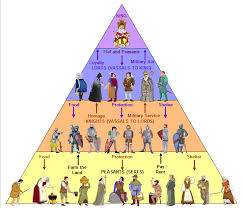记忆方法
将“feudal”分解为“fend”和“-ual”两部分。想象一个人在历史长河中努力“fend”自己,抵抗或保卫,而“-ual”则暗示这是一种持久的状态或体系,从而联想到“feudal”表示封建制度,是一种长期存在的等级社会结构。
以上内容由AI生成, 仅供参考和借鉴
中文词源
feudal 封建的
来自PIE*peku, 牛。引申词义耕作,耕种,指有土地所有权的国王或庄园领主把土地封给其臣民或臣子进行耕作,以臣民或臣子上交一定的地租或提供劳务服务做为交换,类似于中国古代的分封制。该词与feud没有任何词源联系。比较其同源词fee, pecuniary.
英语词源
- feudal
-
feudal: see fee
- feudal (adj.)
- 1610s, "pertaining to feuds," estates of land granted by a superior on condition of services to be rendered to the grantor, from Medieval Latin feudalis, from feudum "feudal estate, land granted to be held as a benefice," of Germanic origin (cognates: Gothic faihu "property," Old High German fihu "cattle;" see fee). Related to Middle English feodary "one who holds lands of an overlord in exchange for service" (late 14c.). Not related to feud.
权威例句
- 1. Diplomacy was in his blood: his ancestors had been feudal lords.
- 他天生擅长交际:他的祖先曾是封建领主。
- 2. Feudal rulers ruled over the country several thousand years.
- 封建统治者统治这个国家几千年.
- 3. The feudal system lasted for two thousand years in China.
- 封建制度在中国延续了两千年之久.
- 4. Many people look back with nostalgia to feudal times.
- 许多人留恋不舍地回顾封建时代.
- 5. This historical novel illustrates the breaking up of feudal society in microcosm.
- 这部历史小说是走向崩溃的封建社会的缩影.

